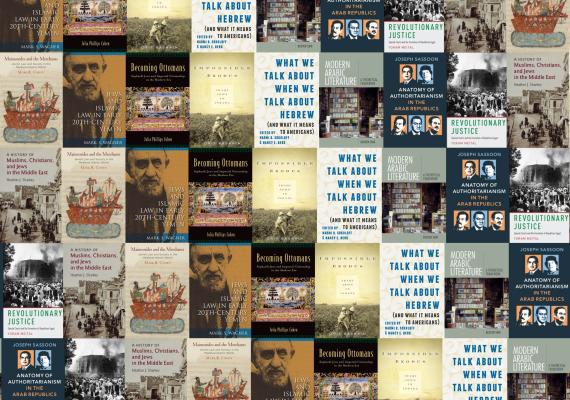What to Read Now

Incoming fellows have ambitious goals for their time at the Katz Center: new research projects, books to write, colleagues to meet and mine for knowledge. As they settle in and get started, we take this moment to celebrate the work that has already been done.
Here is a roundup of recent books by members of the current fellowship cohort, offering a taste of their scholarship. It might also serve as a reading list for those who are only just beginning to explore the year’s topic.
---
Three books offer in-depth studies of the modern experiences of Jews in particular Muslim contexts: Yemen, the Ottoman Empire, and Iraq. They differ in approach but share in common nuanced attention to the surprising ways Jews were politically integrated in majority-Muslim states in the nineteenth and twentieth centuries.
Mark Wagner’s 2014 Jews and Islamic Law in Early 20th-Century Yemen (a finalist for a 2015 Jewish Book Award) explores how Jews and Muslims came to know each other’s laws and traditions. The specific laws imposed on Jews by the Muslim state made some Muslim jurists familiar with Jewish life, law, and lore; and at the same time some Jews saw social value in acquiring extensive knowledge of Islamic law.
Julia Phillips Cohen’s 2014 Becoming Ottomans: Sephardi Jews and Imperial Citizenship in the Modern Era (pb 2016) tells the story of Jewish political integration into a modern Islamic empire, showing that it was possible for more than just small Muslim elite to be seen as “Ottoman.” Imperial citizenship was more complicated than a simple, fixed legal identity—it was constituted by a series of political acts, or performances.
A third book looks at political integration from the opposite perspective. Orit Bashkin’s 2017 Impossible Exodus: Iraqi Jews in Israel looks at the experiences of Jews who left Iraq en masse around 1950 and immigrated to Israel. She calls attention to the “long, painful” process of their integration into the Israeli state, where they were at first relegated to camps, left in poverty, and denied equal civil rights.
---
Several other works reveal the breadth of interests of this year’s scholars, expanding out, for example, to look at language, law, commerce, and politics as cultural drivers within and across religious and national groups.
In light of changing Jewish identities and attitudes toward Israel and Zionism, what does Hebrew do for us? In What We Talk about When We Talk about Hebrew (and What It Means to Americans) (2018), editors Nancy Berg and Naomi Sokoloff bring together perspectives from teachers, writers, and translators on the place of Hebrew in American Jewish culture today.
Reuven Snir, a recognized master of modern Arabic literature and literary theory, offers a comprehensive approach for scholars to map and study different genres, their changes over time, and how they have been affected by non-Arabic literary developments in his major Modern Arabic Literature: A Theoretical Framework (2017).
Joseph Sassoon’s Anatomy of Authoritarianism in the Arab Republics (2016) examines the authoritarian regimes of eight Arab republics between the Egyptian Revolution of 1952 and the Arab uprisings of 2011, looking at politics, economics, and security practices to show how leaders created enduring coercive systems and what led to their eventual collapse.
In Revolutionary Justice: Special Courts and the Formation of Republican Egypt (2016), Yoram Meital looks at the use of special tribunals in the aftermath of the 1952 revolution, when the new Egyptian regime was in conflict with the Muslim Brothers. He highlights the place of democracy and social justice in Egyptian courtrooms at that time, countering those who would claim that the Muslim world is inherently inimical to liberal values.
A History of Muslims, Christians, and Jews in the Middle East (2017), by Heather Sharkey, a Penn faculty member who participated in the shaping of this year’s fellowship theme, examines the history that Muslims, Christians, and Jews once shared. Sharkey shows how, amid the pivotal changes of the modern era, efforts to both maintain and dismantle aspects of Islamic legal tradition regarding religious minorities, heightened tensions and set the stage for the twentieth-century Middle East.
Finally, special mention for a book by a Katz Center alumnus, Mark R. Cohen, who gives the current year’s work some back history in his Maimonides and the Merchants: Jewish Law and Society in the Medieval Islamic World (2017; a finalist for a National Jewish Book Award). Cohen shows that Maimonides inscribed the standards and needs of his own present-day commerce into Jewish law (in the Mishneh Torah), providing Jewish merchants with alternatives to Islamic law and the Islamic judicial system as they arranged commercial collaborations or litigated disputes.
---
This list—just a sampling of the most recent books by some of our fellows—embodies the breadth and depth of the questions that arise from scholarship on Jews and Jewish culture in the varied, rich, and complex contexts of the Islamic world.